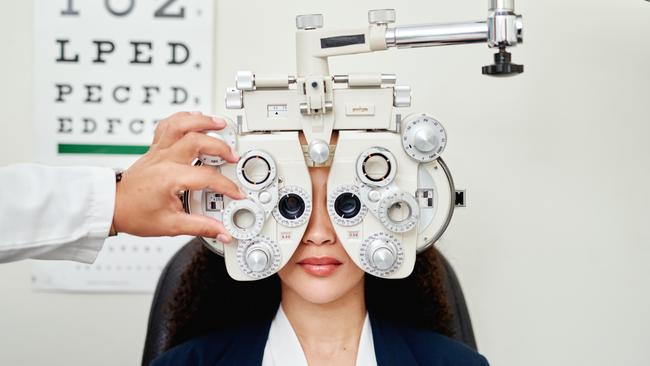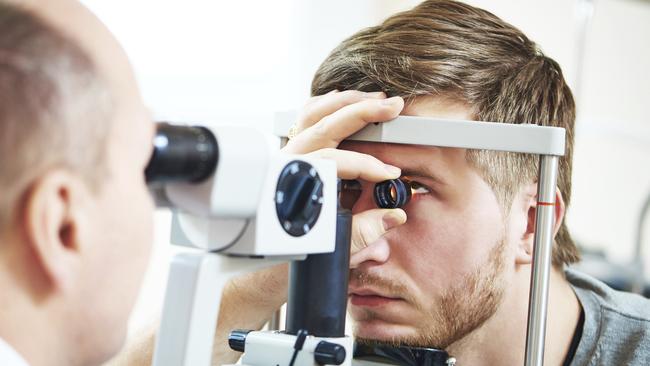If Andrew had waited for his Medicare-subsidised eye examination, he could have gone blind
Eye exams for under-65s are subsidised every three years under Medicare, but optometrists say that’s too long and goes against best practice.

When Andrew Pearce chose to make a 1400km round trip to get an eye examination 18 months ago, he had no idea just how important that decision would be.
It was there that Mr Pearce, 40, was diagnosed with a branch retinal vein occlusion, where one of the veins in the retina becomes blocked. It’s a condition that can be associated with high blood pressure but often has no symptoms, is more common in much older people, and can even be a sign of an impending stroke or result in vision loss.
The mechanic and father of four, from the outback town of Barcaldine in central west Queensland, has a family history of glaucoma. So he opts to have annual eye exams which he pays for out of pocket most years.

His town has no resident optometrist and most of the other medical providers are locums. It means he travels 700km, one way, to Rockhampton for his check-ups. But it’s something he says he needs to do to ensure he remains healthy for his family and as a small-business owner in a remote area. Mr Pearce’s clients include farmers and essential service workers who cannot do their jobs without businesses like his keeping their vehicle fleets on the road.
“(Branch retinal vein occlusion) is something that could possibly get out of control, and I could possibly eventually lose sight in the eye if it went the wrong way. My vision’s definitely important. I’ve got half a dozen employees and a fair size workshop that I’ve got to keep running.”
At present, people with a Medicare card who are 65 years and older can get annual eye examinations subsidised under the Medicare Benefits Scheme. Subsidies may also be available to people who have a chronic condition. However, in 2014 the frequency of MBS eye examinations for people under the age of 65 years went from every two years to every three.
Mr Pearce said that was too long between appointments. “If I had a waited for the three years, you know, I could very well be blind in one eye,” he said.

Stories like those worry Luke Arundel, the chief clinical officer with the peak industry body, Optometry Australia. He’s calling on the government to reinstate MBS eye examinations every two years, saying too few Australians under the age of 65 are getting the eye care they need.
“An estimated 90 per cent of blindness or vision loss is preventable or treatable if detected early,” he said before adding that early intervention would also ease pressure on the broader healthcare system because in many cases it would result in less-invasive treatments.
“More frequent eye examinations increase the likelihood that a range of asymptomatic eye conditions in Australians aged under 65 will be identified earlier, enabling early intervention to reduce the risk of vision loss and impairment,” he said.
Optometry Australia said its own analysis of Medicare data showed fewer people were accessing critical eye care than was recommended. “Between 2017-18 and 2023-24, there was an 18.1 per cent reduction in initial comprehensive eye examinations nationally for this age group,” Optometry Australia said in a statement.
Mt Arundel said the policy change did not reflect best practice. “It’s certainly not in line with clinical recommendations from any of the peak bodies around the world for when a regular or comprehensive eye examination should be conducted, and it was something that optometry Australia advocated against.”
Government health data estimates 13 million Australians have one or more chronic eye condition, based on self-reporting. Optometry Australia has projected that to rise by 39 per cent in the decade to 2030.

While older people are far more likely to have chronic eye conditions than younger people, eye problems in the young are on the rise. Data from the Australian Institute of Health and Welfare compared the prevalence of self-reported eye conditions from 2007-08 to 2017-18 and showed the prevalence in younger people rose from 20 per cent to 24 per cent during that time for people aged under 30. Meanwhile, the prevalence in people aged 61 years and over decreased slightly from 95 per cent to 93 per cent.
Optometry Australia said offering more frequent subsidised eye examinations would be particularly beneficial for low-income families and priority populations including First Nations people, and those from culturally and linguistically diverse backgrounds who often face barriers to accessing healthcare.
A spokesman for the Federal Department of Health and Aged Care said the government was committed to ensuring that Australians have access to high-quality, evidenced-based, accessible MBS health services and acknowledged Optometry Australia’s call for increased testing.
“Generally, changes to the MBS require assessment and supportive recommendations by either the Medical Services Advisory Committee or the MBS Review Advisory Committee,” the spokesman said. “This is to ensure that proposed changes are rigorously evaluated to confirm they are appropriate from both a clinical efficacy and cost effectiveness perspective.”
Opposition health spokeswoman Anne Ruston said the Coalition was focused on “ensuring Australians have timely and affordable access to primary healthcare”.
“We are really worried about the implications that will be caused from this reduction in preventive health,” she said. “We are committed to working collaboratively with both patients and health experts to address these current challenges and plan for future ones.”
As the federal election nears, it is something patients like Mr Peace would like to see both sides commit to, to ensure greater health equity.
“It’s just lucky I’m in a financial position where I can cover my travel, and I can cover the cost of the of the eye exam and that sort of thing every year, whereas there’ll be other people out there who have been waiting on the three years for the Medicare to come through. Where does it leave them?”





To join the conversation, please log in. Don't have an account? Register
Join the conversation, you are commenting as Logout